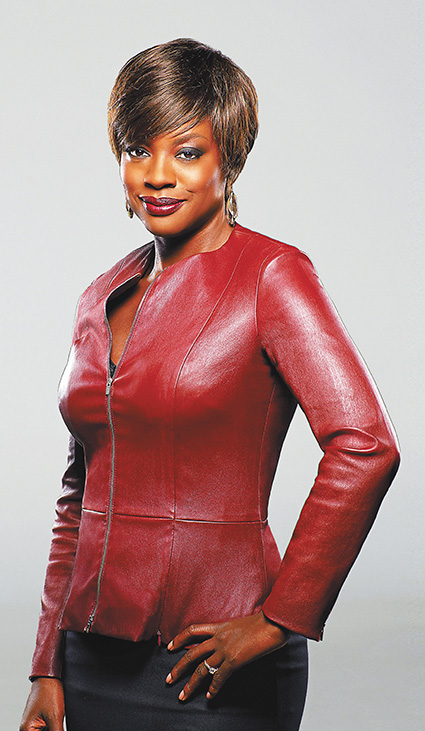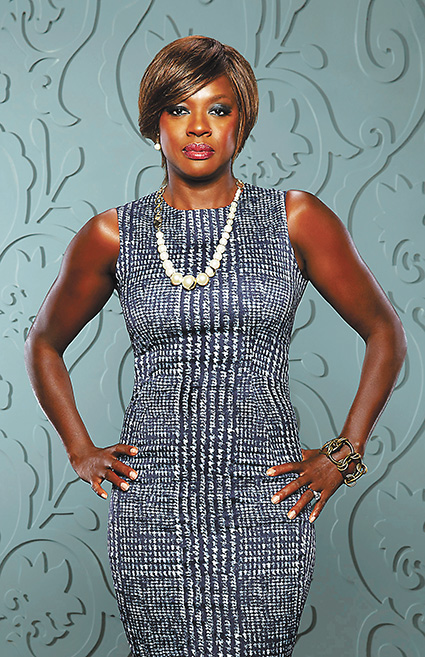Viola Davis
October 15, 2014 by Las Vegas Black Image Magazine
Filed under Cover Story, Feature
‘I wake up every day with the joy of my work’
An exclusive interview with Viola Davis, sharing her thoughts on Hollywood, opportunities for black actresses and a new starring role.
BY KIMBERLY BAILEY-TUREAUD
She made Oscar history as only the second African-American ever nominated for best actress, and that role in “The Help” catapulted Viola Davis into an international spotlight. The accomplished actress, a Tony winner for her flawless work on Broadway, transitioned to silver screen fame with the ease of a seasoned artist and undeniable magnetism. Now, she brings that well-earned prestige to series television with “Scandal” creator Shonda Rhimes’ newest sensation, “How to Get Away with Murder.” In it, she portrays high-powered law professor Annalise Keating, who finds herself ensnared in a murder plot that also involves her students. She recently sat down for a candid and revealing discussion about the road to success and challenges that remain.What can we expect from “How to Get Away with Murder”?
It follows a lawyer who is the top criminal defense attorney in the city and a law professor at a fictional Ivy League school. She chooses four students to work in her law firm, and a mysterious murder takes place. And maybe – or maybe not, we don’t know – they could be involved in it. This is what is introduced in the first episode. It has all the elements of a great procedural show that you grow instantly addicted to. I certainly am addicted to it, every time I receive a new script. But it is also very character-driven. Every character is interesting, and in each episode a character’s profile is given. Much like the peeling away of skin on an onion. And you learn more about each person, and it becomes a litmus test. It puts the pieces of the puzzle together, and it tells you who could or could not be involved with the murder. But the ride itself to understand the murder mystery is just completely exhilarating. I have been in the business for 26 years, and I have never been given a character like Annalise Keating. Never.
Do you think that with the success of “Scandal,” this is another series breaking ground and creating leading-role opportunities for African-American actresses?
Well, what I will say is that Kerry Washington’s success with “Scandal” definitely set the template. Most definitely. And really, “Scandal” did not premiere initially with high ratings. It was Kerry Washington and her involvement with social media that really took it over the edge. So, yes – Kerry Washington really set the template for me, Octavia Spencer, Halle Berry, Taraji Henson, Nia Long and many others. Now, you have Tracee Ellis Ross in “Black-ish,” and all women of color on television, because before I think people really didn’t consider us. They didn’t consider that we could actually lead a show and get viewership. It was because of the success of “Scandal,” they would say, “OK.” Television has now become a place where black women now have opportunities. Because I am telling you – after being in this business for a while, you want a role that is worthy of your talent. As an actress, you work your fingers to the bone, and you become tired of being the third girl from the left. You get to the point where you feel you are deserving of the main role. You deserve it, and you put in the work. I think in the past we have been invisible. We live in a culture where we have been invisible, and I think it’s an example of art imitating life. I hope that 2014 is the end of that, and the beginning of something new.
How is America responding to another black woman playing a lead character in a major network television series?
I have gotten responses both negative and positive from the public about my lead role in a television series. There are people who are very accepting of it, because we are living in a culture where you can look at any bus stop and see a very blonde woman with a crinkle-haired child. So, we are now living in that time. There have been people who are surprisingly accepting. And there have been a lot – especially with the press – of race-related questions. It just is like this with producer and creator Shonda Rhimes and the show. Race is always a part of the questioning, such as, “Your husband is white and you are a black woman?” Or, “How do you feel about the diverse cast?” This is very intriguing to me, because I think Shonda Rhimes is the last person to be asked the race questions. I think people who don’t include this in their narrative should be asked the questions. They are the ones who should really be put to the test, and woken up to what the world really looks like. Nevertheless, the public has been fairly accepting, but I have read some blogs that had nasty comments. There are always people who criticize Shonda Rhimes, and they maybe don’t care for her. I love her. She does have some people out there who absolutely criticize her for her writing style. I don’t know what to say about that. I don’t have a problem with it because I am included in it. I go toward people who make me matter as a character. I go toward whoever sees me. Sees my beauty, my sexuality and sees my talent. I have some people who criticize me and my work. The only thing I can say about that is that I am still in my life, and I wake up every day with the joy of my work. I think I have gotten this far for a reason.
Where does the intensity in your acting come from?
I attribute it to my approach to my work: That is to create human beings from my experiences and my journey. I fell into acting because it was therapeutic for me. I came from a challenging background. Acting was my way to release, and what I found was my gift. A lot of actresses have gifts. My gift is seeing the hard part of life. I grew up around a hard part of life, where people have no filters. When you grow up poor, people have no filters. You know what everyone is doing in the neighborhood, because you live in close confines. You know who the drug dealer is, or who is beating their wives. You know everyone, and it is ripe for an artist to observe who the people are, how they behave and why they do what they do. So whenever I am given a character, that is how I work. I don’t care if I have three lines in a film; most of the time I have three or four scenes, because that’s what is out there for someone who looks like me. My hue, my age and my sex. I dig into a character and I have to create a human being. As opposed to doing three lines and being a gimmick – I get to know my character, and why they are saying what they say. Maybe that is why my characters are intense.
How did “The Help” impact your career and your craft?
I had a great experience working on the film. All of the relationships I made – and still have in my life today – with my fellow cast members changed my life. And my career, because the film made a lot of money. That is how people value you in this business. If you are in a film that makes a lot of money, your profile rises. It’s as simple as that. I was nominated for an Oscar in the Best Actress category, which has prestige. I didn’t ask to be put in that category – they pushed me into it, and my career changed. All of the sudden, the quantity of the opportunities changed. The quality, not as much. So then what I had to do – as an artist, as a professional and as an educated woman – is start my own production company with my husband. Our production company creates narratives for people of color and also Caucasian actors, because you always need a Caucasian actor that has bankability. We are going to create stories that are different, multi-faceted, excellent, and put them out there in the world. We are in the process of selling the template for a biopic of Texas Congresswoman Barbara Jordan. This is a tremendous story for many reasons — not just because she is an epic person in history. But what she represents is an inspiring narrative that could be very powerful about where we are in gender, race and politics. It will be very intelligent and moving.Black women die from breast cancer at high rates, because of the lack of medical treatment. What words of encouragement can you offer to women who might have breast cancer and those who are survivors?
I have had several friends who have already succumbed to breast cancer – or they had the BRCA gene, and they have elected for surgery to get the double mastectomy and their ovaries removed. It is very close to my heart. I would encourage women of color to stay on top of their breast health. That is number-one. I get my mammogram every six months. I encourage black women who have had women – mother, grandmother, sister, aunts – with cancer in their family to get screened for the BRCA gene. Thanks to President Obama, the screening is available now for women. If you can show just cause because of a lineage of cancer in your family, your insurance will pay for the test. The test is just a swab process. I just had a friend of mine that was 36 years of age who succumbed to breast cancer, and her last words were, “I am going to fight to the end.” The only thing I can offer is that I am in the battle with them. Totally in prayer, thought, and to reiterate – stay on top of your breast health. Stay on top of nutrition, diet and all of that, because there is so much available out there that can catch cancer before it spreads. If you stay on top of your breast health, this is the best I can offer. I stand in solidarity with every woman out there that is fighting this good fight. I stay on Facebook constantly with all of my friends who are now battling it. I pray for them on a daily basis. It’s basically the only reason I stay on Facebook, for friends of mine who are battling breast cancer. I pray with them and offer words of encouragement. I do everything in my heart, in my ability, to let them know that they are not alone. Because I know it is a lonely fight and a lonely battle. The best thing I can offer is good health. This is what I offer my friends.







